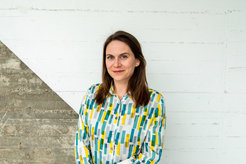"This is us" - Questions for Elisa Buchberger
Our institute has over 300 employees. But that is just a number. Who are the people at our institute? What do they do and what drives them? In our "This is us" format, colleagues answer questions about their work and their motivation.

On the occasion of International Women's Day on March 8, 2023, we started the series “This is us” with 15 female scientists from our institute. We are picking up where we left off and introducing the scientist Elisa Buchberger from the Center for Lifespan Psychology. In the last episode we introduced Lou Haux from the Center for Adaptive Rationality.
You work in the Center for Lifespan Psychology and work with the memory development of children, among other things. What fascinates you about this topic?
Childhood is a particularly exciting period of our lives for me, especially when it comes to the development of memory. As a rule, we barely remember the first years of our lives. Nevertheless, it is precisely at this young age that children acquire impressive amounts of new knowledge about the world. I am interested in how children achieve this balance. How is it possible to recognize regularities in one's environment and build up new knowledge when the memory of individual events is still so unstable? How does the ability to form specific memories develop across childhood and what neural processes are important for this? It is precisely this interface between changes in behavior and corresponding maturational processes at the neural level that fascinates me.
Can you briefly summarize your results, did anything surprise you?
The results of my studies so far show one thing very clearly: In early and middle childhood, the ability to form memories changes enormously. While children at the age of about 4 still have great difficulties in remembering experiences in detail, children at the age of about 8 are amazingly good at it. At the same time, we also see that children in this age range rapidly become better at recognizing regularities across several experiences. What I find surprising is that the relationship between the two changes with age. If older children are good at remembering individual experiences, they are usually also able to use commonalities between these experiences in new situations. This does not necessarily seem to be the case with younger children. Even if they remember individual experiences, this is sometimes not enough to extract general structures and apply them.
What do you particularly like about working with children?
What I find most refreshing about my work is the honesty of the children. If the memory games I use in my studies are boring, my little test subjects let me know very quickly. But in the same way, children are also particularly enthusiastic and curious–and they show that very clearly, too. I love this challenge of making my studies exciting for children's eyes as well. In general, working with children is always a bit more colorful and noisier than perhaps with adults, but that never makes the day-to-day research boring.
You are a young female scientist. There are still far fewer women and non-binary people than men who can serve as role models for a career in science. Who inspires you and why?
I find it encouraging that the topic of diversity is now also becoming more present in research, even though we certainly still have a long way to go. It is very encouraging to see that people from marginalized groups are increasingly gaining recognition in the scientific community with their research. I believe that science in particular needs a diversity of perspectives and experiences in order not to get stuck in old patterns and ways of thinking. In my daily life, I am also especially inspired by working with my outstanding female colleagues. Seeing how they make a significant contribution to scientific knowledge with their daily work, how they overcome obstacles and structural injustices, and how they assert themselves in the science system day after day, is impressive.
What do you appreciate about the Max Planck Community?
What I value most about the Max Planck Community is the exchange across working groups and disciplinary backgrounds. I find it very enriching to discuss my own research with people who have a completely different theoretical background than I do. Often, such interdisciplinary discussions bring in completely new perspectives and provide food for thought for new scientific questions or approaches.
